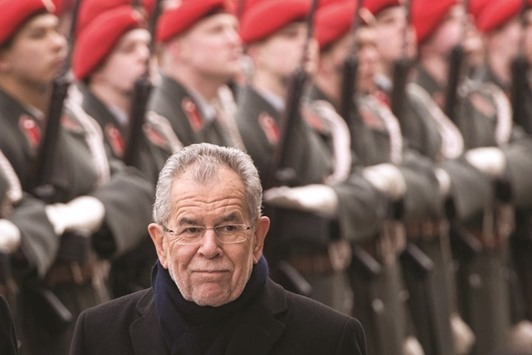In a close re-run vote, Van der Bellen, a former Greens party leader, prevented Norbert Hofer of the anti-immigration Freedom Party (FPO) becoming the first freely elected, far-right head of state in Europe since World War II.
But polls suggest that the FPO would win the next general election.
In an inaugural speech to parliament after he was sworn in to the largely ceremonial post, Van der Bellen said he would work for all Austrians but rejected core tenets of the populist wave that has swept Britain and other Western democracies.
“I see the biggest danger as letting ourselves be ensnared by easy answers, and thereby tipping into nationalism ... that cannot be in Austria’s interest as a small country,” he said.
Austria’s president is traditionally a father-of-the-nation figure who only occasionally intervenes in public.
But he also exerts influence on the government and political parties behind the scenes.
The post had been vacant for six months because a re-run of the vote was ordered over irregularities in the count.
Van der Bellen’s arrival could help ease tensions between Austria’s two centrist coalition parties, which are seeking to agree on a list of new priorities that would keep their alliance alive and counter perceptions their government is ineffective.
Chancellor Christian Kern, a Social Democrat, said this week that he wanted an agreement by today or the coalition risked collapse.
That would trigger a snap parliamentary election that polls indicate the Freedom Party would win.
The current parliament’s term runs until autumn of next year.
Van der Bellen warned during his campaign of the dangers of a Freedom Party-led government and said he would try to prevent that happening.
The president suggested on Wednesday that the coalition should do its part to avert that outcome.
“Politics is not just talk – that is also important – but it most provide results,” he told parliament. “Austrians are waiting for the necessary decisions and results that will improve their lives and for that I wish you all the best.”
Kern this month outlined a 145-page plan of action to tackle issues such as unemployment and educational reforms.
His conservative coalition partners have made their own proposals on increasing security and cutting immigration.

